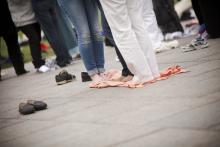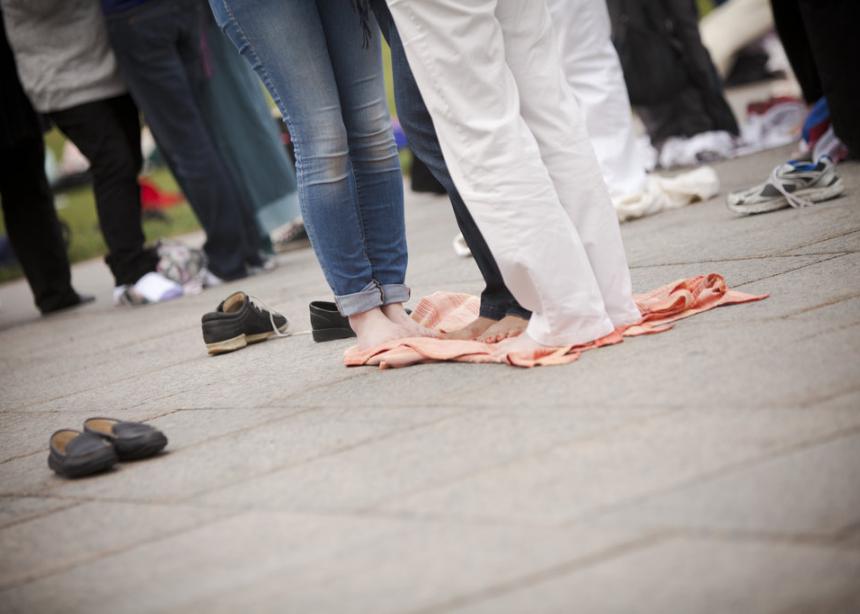Many across this land are wondering how to respond to protesters blocking rail lines, ports and government offices in solidarity with Indigenous groups who oppose the Coastal GasLink pipeline in northern British Columbia.
So far, I have not heard any answers that suggest starting with prayer.
Pausing to pray would cause us to, well for starters, pause.
A pause might allow us to reflect on Creator God’s love for each person and for creation, regardless of where we stand on political issues. A silent prayer might allow to us recall God’s desire for us to be people of peace, justice and friendship amid conflict and tension. A moment of reflection is also a space to think on our own complex histories, and the remarkable wealth and hospitality we enjoy from lands stewarded by Indigenous peoples.
For me, pausing for prayer often allows important memories to return. Like memories of the time – 25 years ago – when I walked with my Indigenous friends and neighbours in a place called Ipperwash. I recall police officers being directed to use force to end protests over land. The police actions not only failed to end the protests, but brought an end to the life of an Indigenous man named Dudley George. Dudley George, who died of a police gunshot wound, was a friend of mine and of Mennonite Central Committee (MCC).
I learned then – and recall today – that violent solutions to complex issues are rarely effective. I am grateful there seems to be a greater level of patience and restraint today than two decades ago. But prayer and a call for non-violence is still necessary.
MCC has a long history of relationships with Indigenous peoples in Canada. We also have a long commitment to non-violence grounded in our understanding of what it means to be followers of Christ.
We invite you to join us in prayer for the safety of all persons involved and for leaders to use their wisdom and discernment in this process. Let us pray for a peaceful end to protests and blockades; disputes ended by force are not really ended. Let us remember our relationships with Indigenous friends and neighbours as we, together, continue the hard work of reconciliation.
Let us today pause, reflect, pray and call for a peaceful response to a generations-old conflict.
Rick Cober Bauman is the executive director of Mennonite Central Committee Canada. This reflection originally appeared at mccottawaoffice.wordpress.com.

Hundreds of people participated in a mass blanket exercise on the steps of Parliament Hill, lead by members of Kairos. Members of First Nations communities, faith communities and many others participated, including those from Mennonite churches and MCCers from across the system. (MCC photo by Alison Ralph)


Comments
I have been noticing for quite awhile how different MCC’s communications are regarding Indigenous justice issues and the justice issues of Palestinians. Media releases about the Palestine Israel situation contain much more politically specific language often using post colonial narratives. When it come to Indigenous issues in Canada the language becomes spiritually generalized and pastoral. So to summarize MCC’s contrasting approaches: MCC desires Land Back for Palestinians but only thoughts and prayers for a peaceful end to the Indigenous blockades.
It’s deeply troubling that Rick Cober Bauman invokes the memory of Dudley George without naming why he died. All of the many blockades that have occurred in Canada over the decades involve Indigenous people defending their land and tirelessly pursuing a long list of unresolved land and resource claims with federal and provincial governments.
Rick needs to be honest and very politically specific about what the hard work of reconciliation means. There can be no reconciliation until land claims are settled and meaningful mechanisms for wealth transfers are established so that First Nations can become self governing entities. Settler Mennonite Canadian citizens must join all Canadians in being willing the divest of their wealth so that Indigenous children can enjoy the wealth and prosperity of their ancestral lands. We cannot begin to have meaningful friendships with Indigenous people until we do this hard work.
Prayer as Deflection: The magic of misdirection and vanishing justice
“In response to blockades: prayerful pause” (CM Feb. 27/20) contains some of MCC Canada’s executive director Rick Cober Bauman’s reflections regarding Indigenous land rights issues which have surfaced recently in response to the Coastal Gas Links' pipeline installation on Wet’suet’en territory in British Columbia.
Mr. Cober Bauman recommends that prayer should be our response, “Let us today pause, reflect, pray and call for a peaceful response to a generations-old conflict.” It is unclear if Mr. Cober Bauman would want the blockades to be ended, however on the surface of things, a neutral observer might come to the conclusion that the blockades have been more efficacious in moving governments towards land rights resolution, than the prayer recommended by Mr. Cober Bauman.
I believe that Mr. Cober Bauman’s call to prayer is a deflection from the real leadership necessary for a just resolution of Indigenous land rights issues. Through this misdirection of focus, Mr. Cober Bauman chooses to ignore the call to MCC Canada supporters (Anabaptist/Mennonite Christians) to respond justly to Indigenous land rights issues. Calling Anabaptist/Mennonite Christians to respond justly would have been the better choice. Our god Yahweh, is a god of justice.
Anabaptist/Mennonite Christianity is deeply implicated and culpable in Indigenous land rights injustices. Perhaps early on in our Canadian historical narrative (1874 Manitoba), Mennonites could say “we didn’t know the land was stolen,” that we didn’t know Indigenous folks were removed from the land by the Canadian government indiscriminately, through starvation, bribery, trickery, and whatever other means necessary at the time. Perhaps we can say we didn’t know, but we do know now. It is deflection and misdirection not to acknowledge that this is so. It is not too late for us to repent, to turn towards Yahweh and see God’s justice done.
Mr. Cober Bauman has deflected the focus of the MCC Canada constituency by refusing to identify the complicity of the Anabaptist/Mennonite Christians in Indigenous land rights injustices, and by refusing to call Anabaptist/Mennonite Christians to account for continuing to participate in said injustices. I don’t think that Yahweh is fooled by a call to a peaceful, prayerful resolution, at the expense of justice.
I suspect that Anabaptist/Mennonite Christians would have a less than peaceful response, if Mr. Cober Bauman was seriously calling for a to return to Yahweh’s justice, such as the Year of the Jubilee, and “giving back the land,” and selling all you have and giving to the poor. The Indigenous lands rights issues act as a mirror for Anabaptist/Mennonite Christians, we see the results of our actions, actions deeply rooted in injustice, reflected back to us. We need our leaders to call the people back to Yahweh’s justice.
Ms Shantz is calling for "wealth transfer."
I thought that this was already being accomplished under the current Canadian government and the some 9-10 billion spent every year through the Indigenous Affairs and Northern Development portfolio. The Hereditary Chiefs of the Wetsuweten already get the divine right of aboriginal noble's share according to their public financial accounts.
The elected members of that same community are being held hostage in this called for 'pause.' They are looking forward to work and participating in the economy of Canada, with the attendant benefits and responsibilities.
What Ms. Shantz is calling for, puts a religious veneer to what will amount to an aboriginal kleptocracy by the few, and continued aboriginal poverty for the many. Continued serfdom is not salvation.
Add new comment
Canadian Mennonite invites comments and encourages constructive discussion about our content. Actual full names (first and last) are required. Comments are moderated and may be edited. They will not appear online until approved and will be posted during business hours. Some comments may be reproduced in print.